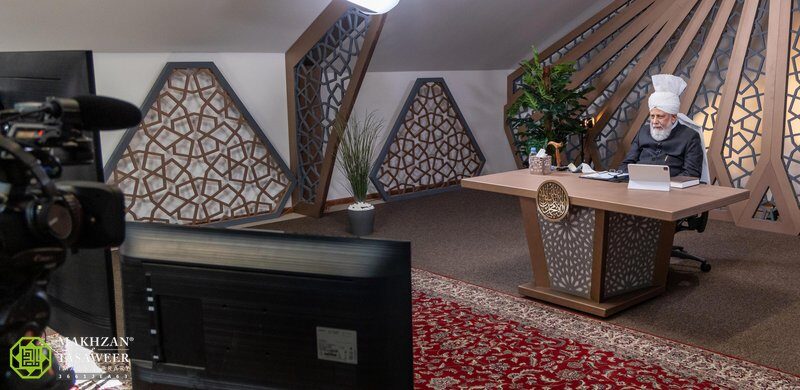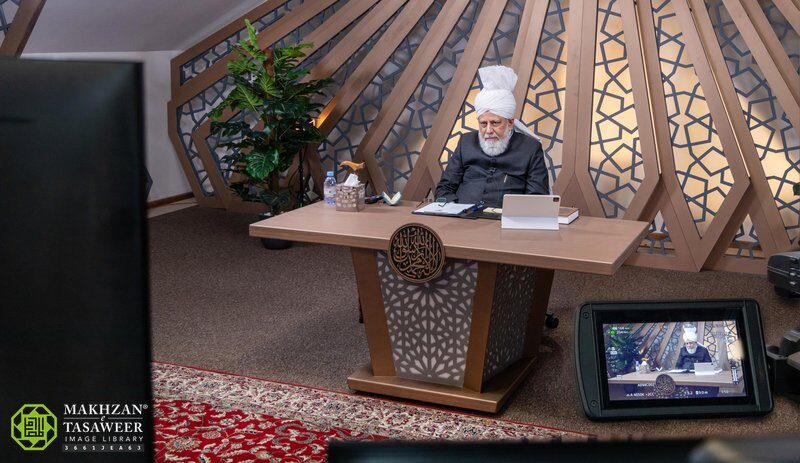
On 28 May 2022, Lajna Imaillah members of Waqf-e-Nau USA were given the opportunity to meet Hazrat Mirza Masroor Ahmad, Khalifatul Masih Vaa through a virtual class.
A total of 106 waqifaat-e-nau, representing 33 majalis were present for the class.
As the live stream started, Hazrat Khalifatul Masih Vaa conveyed his salaam and called Tanzeela Virk Sahiba to recite a portion from the Holy Quran. After the recitation, Sabah Ijaz Sahiba presented the Urdu translation and Saima Ahmad Sahiba read out the English translation. Next, Manahil Mehmood Sahiba presented a hadith and its Urdu translation, after which Numana Luqman Sahiba read out the English translation. Then Fiza Ahmad Sahiba recited a poem and Amatul Haleem Zayn Sahiba presented the English translation.
Huzooraa then invited Jaziba Munawar Sahiba to read out an Urdu extract from the writings of the Promised Messiahas. Following this, Hania Khan Sahiba presented the English translation.
Thereafter, the waqifaat-e-nau had the opportunity to ask Hazrat Amirul Momineenaa any questions they had.
Shafia Javed Sahiba, from Hartford Jamaat, asked Huzooraa how one could achieve moderation in life and learn to be steadfast without going to any extreme.
Huzooraa said:
“Islam is a very balanced religion and if you follow the teachings of Islam, you will always be moderate. There is no teaching in Islam which takes you to extremism.”
Shafia Javed Sahiba gave the example of herself and said that sometimes, she would be very focused on her studies and would try to do everything perfectly and really well, but while doing so, she would end up neglecting other obligations. She said that she wanted to achieve a balance.
Hazrat Amirul Momineenaa answered that she should pray to Allah to achieve this. “So, if you pray to Allah the Almighty, Allah the Almighty will help you, insha-Allah.”
Aaliya Ahmad Sahiba asked Huzooraa how one could reconcile differences between two parties who believed their own viewpoint was correct.
Huzooraa said:
“If they appoint you as the judge, then you must listen to them and wherever you see more weight in their arguments, you can decide in favour of that. But there should be a logic behind your decision and it should not be just for the sake of giving [a] decision, or taking the side of somebody who is close to you, you just give a decision, no. Allah Almighty says in the Holy Quran that you must show justice and stand against all evils and if you are asked to bear witness against yourself – if you have to stand against yourself or give witness against yourself, your parents, your kindred, your children, your siblings, then do it. So, if you are doing justice, then it is okay, no matter who the person is or the party is.”
Eisha Bhatti Sahiba said that the US Supreme Court may ban women from receiving an abortion in all cases. She asked Huzooraa if Islam allowed abortion in the case of rape and in the case of health problems for the mother and the baby.
Hazrat Amirul Momineenaa said:
“That is the burning issue in the United States, nowadays. Islam says that you should not kill your children because of the fear of their upbringing or because of finances. That is the only thing which Islam prohibits for abortion. Otherwise, Islam says that if the health of the woman is not good, she can have an abortion; if the baby is not properly developing, they can do abortion, even from the foetus stage to the later stage. So, in the case of rape, also, if the woman likes that she cannot bear the burden of this child because of the society, they will raise fingers at her all the time, and even if the child is born, the child will also face difficulties in his or her environment, then the mother can decide to get it aborted. Islam permits it.”
Hazrat Khalifatul Masih Vaa emphasised that one should not get an abortion simply for the fear of not being able to provide financially for the child. “Allah says that ‘I provide you for your wellbeing, I provide you your food and I am the Provider.’ So, you should not kill your baby or kill your unborn child because of the fear of wealth,” Huzooraa explained.
Fiza Ahmad Sahiba asked Huzooraa how to maintain a pure persona when the habits and language of today’s teenagers would influence others of the same age subconsciously.
Huzooraa said:
“If you are a true Muslim, if you believe in one God, if you are reading the Holy Quran and you know the teachings contained in the Holy Quran, and if you know the spirit of the bai‘at, and if you are following the teachings or guidance given to you by the Khalifa of the time, you will not face such types of difficulties.
“The thing is that we should not only claim that we are Muslims, we should [also] try to find out what commandments are given in the Holy Quran by Allah the Almighty, what are the teachings of Islam; and if that is the case, then we shall reform our environment, our surroundings, not that they influence us. And pray to Allah the Almighty as well that Allah the Almighty may always guide you on the right path”.
Amatul Haleem Sahiba asked Huzooraa how one should respond to those Christians who said that they prayed to Jesus and then their prayers were answered, and so, they say, this is why they believed that he was God.
Hazrat Amirul Momineenaa explained:
“That is their belief because they think their prayers are being answered by Jesus Christ […] Even Hindus believe in different deities, and they say that ‘our prayers are accepted by our deities.’ During the time when the Holy Prophet, peace and blessings of Allah be upon him, appeared and he asked the people to worship one God, the people of Mecca were idol worshippers and they used to believe that their deities were accepting their prayers and they were being answered.
“So, ask [Christians], before the birth of Jesus Christ, were the prayers of people not being answered or accepted? What did people do at that time? Jesus Christ [appeared] just 2,000 years ago; before that, who used to listen to the prayers of the people? Or were they not being accepted? […]
“According to their belief, Jesus Christ is not the father, he is the son. When the father is there to accept our prayers, why should we go to the son for intercession or for anything? […]
“There is no logic behind their belief.” Huzooraa then encouraged her to read more literature of the Jamaat and in this way, she would learn more about this matter.
Hazrat Amirul Momineenaa said that when somebody’s difficulty was removed, it was only by the mercy of Allah and not because they prayed to their deities.
Jazbiya Faseeh Sahiba said that their Jalsa would take place in June, after a two-year gap due to Covid. She requested Huzooraa to bless them with a concluding address on 19 June.
Huzooraa smiled and said, “I think you are representing your Amir Sahib. […] at present I don’t have any plan to give you any virtual, online address. So, if possible, when I visit you [in America] then we shall see.”
Afia Alladin Sahiba asked Huzooraa what ways one could avoid being asked unnecessary questions.
Huzooraa said:
“You cannot force anybody that they should not ask unnecessary questions. If they are unnecessary, just avoid the person. This is what the Quran says:
عَنِ اللَّغْوِ مُعْرِضُوْنَ
“[That is] if you hear anything which is not appropriate [and is] unnecessary, then just leave it and leave the place. That is the only solution.”

Syeda Sabahat Sahiba asked Huzooraa what some of his daily practices were to take care of his health.
Huzooraa said:
“From morning to evening, there is work. So, I don’t find time to do exercises or do something else; but at least, you are young, you should do it. Take care of your health because you have been given the task to reform the world, and if you are healthy, then you can do your work in a proper way.”
Samreen Shiraz Sahiba said that sometimes, when one woke up for the Tahajjud prayer, naturally or by an alarm, one would tend to go back to sleep. She asked how one could get up and perform Tahajjud prayer.
Hazrat Amirul Momineenaa answered:
“Before going to bed, you must pray to Allah the Almighty that whenever the alarm goes off, you get up. So, Allah the Almighty removes all your laziness.
“From the very first sound of the alarm, you should get up and sit on your bed; instead of stretching your body doing this and that and after that going to sleep again. So, this all depends on your willpower and determination, and you should develop that habit.”
Next, Huzooraa was asked for his advice for those girls who were studying away from home, and when one must work with boys in class and on school projects, how one could be a good team member while maintaining purdah.
Huzooraa said:
“The Holy Prophet, peace and blessings of Allah be upon him, says:
الحياء من الإيمان
“‘Modesty is part of your faith.’ If your dress is modest, and you are wearing the dress which can cover your body, bosom, face, and everything [that is required to be covered], you are observing all of the protocols of purdah, then you can do whatever you like.
“The Holy Quran gives the example of two women – two girls – whose father was old and they were waiting for their animals for them to drink water from the source – a well or whatever it was – and Mosesas saw them and he helped them and he took their animal and they drank water and after that, the girls went home. And after some time, one of them came out again and asked Mosesas that ‘my father is calling’ – and it is explained there [in the Holy Quran] – that she was very well composed and even shy and very modestly she asked Mosesas that ‘my father is calling you’. So, that shows that women should always behave very modestly, their dress should also be modest, their speech should also be very well composed, and when you are doing research or something like that, you can do that with the boys but only limit your talks to that subject, not that you get free and then mix-up in their parties and gatherings and go outside with them, no. As far as your work is concerned, you can work with them because that is part of your education, or if you are working and it is part of your job; but [do] not permit yourself to relax in such a way that all the limits of your modesty are broken. So, if you follow this protocol, then you will always be safe.”
Hazrat Khalifatul Masihaa then conveyed his salaam to everyone and the class came to a close.
(Report prepared by Al Hakam)


Jazakallah for the report, please mention the names of all questionnaires in the published report who were blessed with the opportunity to ask our beloved Huzur the questions, as for instance the last very burning question regarding purdah was mentioned but the name of the waqifa was missing.